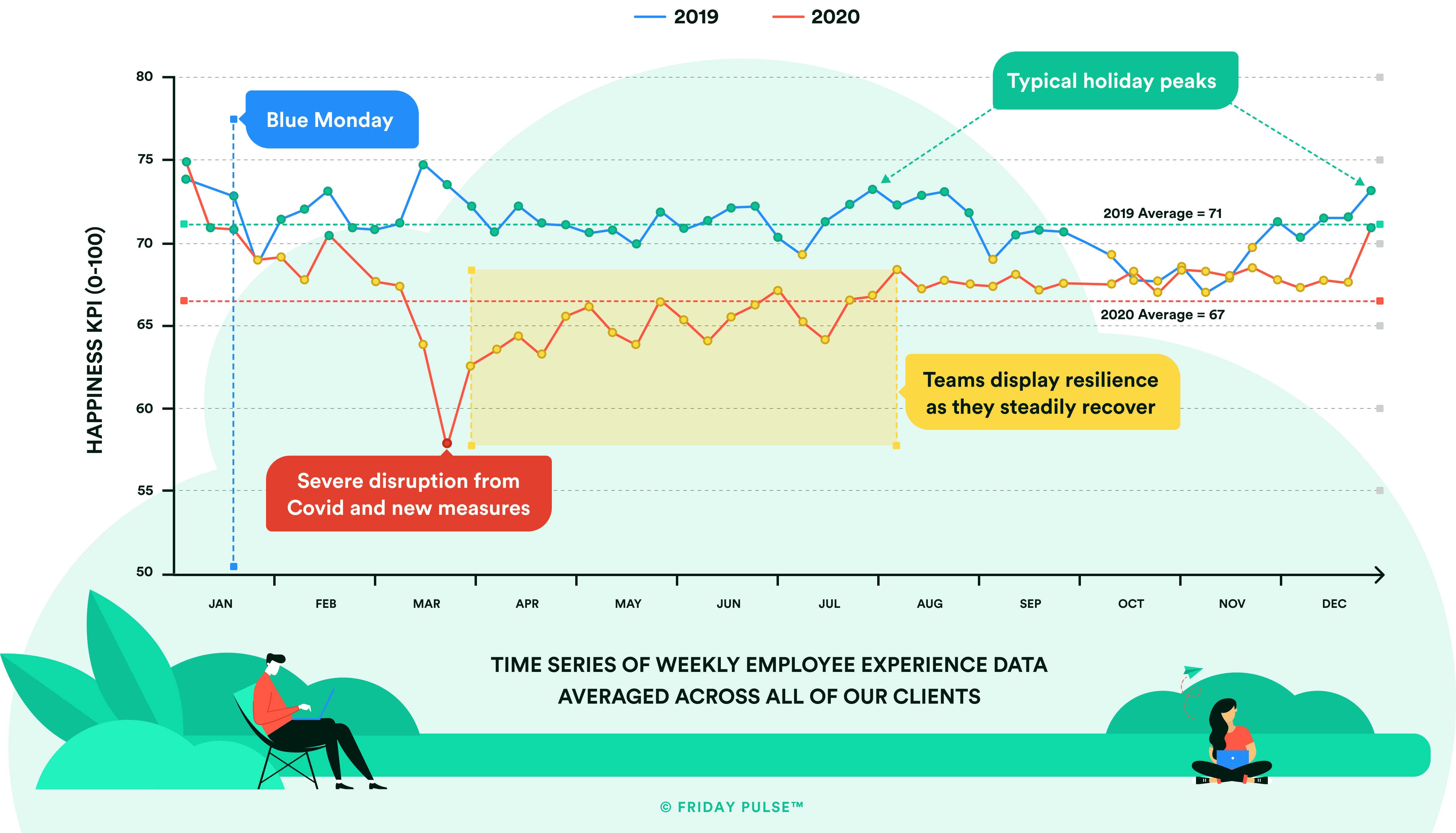Thank goodness 2020 is over.
Yet, the beginning of 2021 feels little different from other years, doesn’t it? While there certainly is a sense of relief from surviving the worst year in generations, there’s also a pervasive sense of apprehension lingering. We survived (thankfully!); but how many of us actually feel like we’ve thrived over recent months?
Throughout the world we’ve endured nearly an entire year of stringent social distancing and/or related COVID restrictions. And the early forecast for 2021 is looking to be more of the same. The UK, much of continental Europe as well as parts of the US, Australia and beyond are all currently experiencing upticks in COVID-19 infection rates.
Blue Monday, allegedly the most depressing day of the year, is almost upon us, bringing its annual dose of post-holiday trauma, seasonal despair, and job dissatisfaction. Combine this with lockdown restrictions in many geographies and you’ve got a recipe for a very blue Monday indeed. So, as managers continue to play an essential role in determining how well their organisations navigate the ongoing pandemic, we’ve again partnered with Nic Marks, a leading London-based statistician, well-being expert and founder of Friday Pulse, to provide some practical, positive advice for beating the Blue Monday ‘blues’ on January 18th (and beyond)
Happiness in 2020 vs 2019

Friday Pulse clients track their happiness scores on a week to week basis. The difference is stark. In 2019, there were definite peaks over holiday periods—Easter, summer, and Christmas—which makes sense. People are happier when they have time off. When COVID-19 hit in March of 2020, however, happiness scores plunged, and it took the rest of the year to climb to normal, Autumn levels. Because of COVID-19 restrictions, there weren’t really any seasonal peaks in 2020, and a much smaller peak over the recent Christmas holidays. Altogether, this resulted in the final 2020 average weekly happiness score being 4 points lower than in 2019 (67 points versus 71 points).
Lower happiness also results in lower performance. Friday Pulse estimates that a 4 point drop typically translates into a $1,500 (£1,000; €1,200) annual loss per an employee (in terms of reduced productivity and increased flight risk)1. Hence happiness has some very real cost implications.
Bear in mind that these are Friday Pulse clients who have taken active steps to address their employee wellbeing and happiness. Friday Pulse’s happiness data mirrors the results of a recent international survey of 1,500 executives2 conducted by Robert Half, which found that 37% of employers are aware that their employees continue to manage heavy workloads and are on the brink of burn-out because of the continuing pandemic. In response, 42% of companies surveyed have started offering mental health resources and 32% general wellness programmes to assist their employees.
So, there is still reason to hope that 2021 can and will be a better year – particularly as we’re carrying forward important knowledge and hard-won wisdom from 2020. We’re in a world now where employee wellbeing is definitely front and centre for most companies. In previous blogs we’ve discussed the importance of being empathetic, setting reasonable expectations, being more appreciative of each other, and connecting. Many businesses are now leading with happiness in mind and are seeing great results.
We already have the tools to have a great work year in 2021. Individually and collectively, we just need to use them in the right way.
How to beat the Bluest of Blue Mondays
Perhaps the biggest problem with the beginning of 2021 is that many of us feel worn down by the pandemic. Many people have spent their entire Festive Seasons in full lockdown or isolation. There’s a widespread feeling of frustration, sadness, grief, and sorrow over the events of 2020.
So, the challenge then becomes: How do we find some energy again? Where can we get a lift—especially in our work lives?
Connect and collaborate
With millions of us still socially distant, the first step to beating Blue Monday is connecting with others. When we connect and form bonds with our colleagues (even remotely), it makes work easier and more enjoyable. Genuinely listening to each other’s challenges kickstarts a cycle of trust, understanding, and positive emotions. This, in turn, makes it easier to counterbalance the negative experiences of work and alleviates the stress of our situations. These are principles that apply in ANY workplace situation, pandemic or not.
Team leaders can even take this a step further by having team members that are friends collaborate on projects together. It may not be the most ‘efficient’ use of time, but it would undoubtedly be a lot more fun. And in the end, fun in the workplace is good for employee wellbeing (not to mention productivity in the long run).
Variety is the spice of 2021
If the doldrums of ‘more of the same’ is pervasive at your company, then variety could be the answer. This doesn’t mean breaking up teams or tossing arbitrary objectives for the sake of changing things up, though.
It’s about rediscovering the things we love about work.
Allow your people to carve out time for passion projects which align with your business objectives. This could prove to be an energising and empowering use of time. Some people may not know what they love about work, and that’s fine as well. Give employees the freedom to explore, and when they find it, let them see where their interests go.
Talk to your team members and find out what their strengths are, rather than just their efficiencies. Learn more about their interests and allow them to develop a new project. It could put the wind back in their sails about work and leave them feeling empowered.
Celebrate victories
Many of us have a tendency to focus on problems rather than wins. This is because of negative bias, and at this stage in the pandemic cycle, it can make a bad situation worse. To counter that, all of us need to make an effort to celebrate the victories. Even the little ones (especially the little ones, in fact).
Of course, some problems need to be addressed. There is a time and a place for problems, just as there is a time and a place for celebrating victories. Yet, for many companies, the time and place for celebrating wins is later. And when later comes, it’s already too late. Moving on without acknowledging wins can leave team members feeling ground down and resentful—eventually leading to burnout.
Celebrating victories means talking about what team members are doing well or drawing extra attention to a team member’s efforts. It means relishing the energy that comes from employees being excited about passion projects or their personal wins.
Looking ahead: How to thrive in 2021
Thriving, not just surviving, is about connecting with our teams, and having room to follow our passions in work. It’s about rediscovering what makes us happy in work and celebrating victories (big as well as small). But most important of all, it’s about recognising that this moment (however dreadful) will not last forever, and the blues don’t have to last all year.
On Blue Monday 2021 – as well as the other 364 days of this year – having a happy and engaged workforce really comes down to connecting with one another and empowering your people to follow their passions. At the risk of sounding incredibly radical, think of 2021 as being the year we all press the ‘reset’ button and remind ourselves about where and how we can all enjoy working again.







